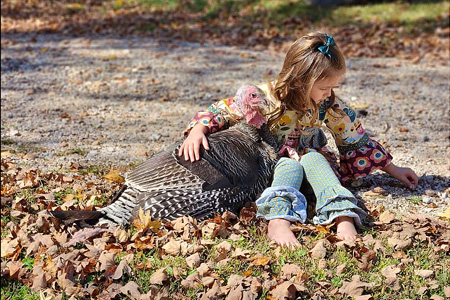
Turkeys are much bigger than chickens and therefore would seem to be unlikely as companion animals. Nonetheless, they are becoming ever more popular as outdoor pets. Here are some reasons why turkeys make good pets:
Why Turkeys Make Good Pets
A turkey makes a good pet for many of the same reasons a cat or a dog is kept as a pet. Turkeys are inquisitive, docile, friendly, and even affectionate. They will follow you around like a dog, and love to sit still while you cuddle and stroke.
One reason turkeys bond so readily to people, and especially kids, is that they are social creatures. A single turkey doesn’t like to be alone. But, aside from liking to be with other turkeys, it will get along with other barnyard birds, including chickens and guinea fowl (see keeping turkeys with chickens), as well as with other livestock, especially goats and sheep.
A full-grown turkey is a low maintenance bird. Compared to a chicken, a mature turkey tends to be less delicate and more hale and hardy.
Turkeys are not only entertaining, but they also like to be entertained. For instance, turkeys like to listen to music.
Disadvantages to Keeping a Pet Turkey
Keeping a pet turkey is not without a few disadvantages, starting when the bird is young. A turkey poult requires careful attention in the brooder until it reaches about 8 weeks of age. However, the extra time spent with a young turkey will ensure that it bonds with you to become a good pet.
Once grown, a turkey can be noisy. A tom turkey’s gobble is one of the loudest sounds turkeys make. Turkeys also cackle, cluck, and yelp. Depending on wind and other weather conditions, these sounds can carry quite a distance.
Turkeys are big birds. They scratch the ground, like chickens do, only more so, because they’re bigger. And because of their larger size, they need more space to exercise and forage.
A good size yard for a pet turkey is 90 square feet. Younger turkeys, and smaller breeds, can fly and may require a high fence, or at least have their wings clipped. A shelter from wind, rain, and cold should be 6 feet by 8 feet, although that size will accommodate more than one turkey.
Keeping turkeys may be illegal where you live. Check that out before you decide.
Heritage Turkeys Make the Best Pets
Heritage turkeys make better pets than broad breasted turkeys. The latter are industrially produced for meat production. Once they reach full size, they start developing joint, heart, and respiratory health issues.
In contrast, Heritage turkeys are considerably smaller and slower growing. They therefore don’t suffer from the complications brought on by excess weight. They are also more disease resistant and better foragers.
And heritage turkeys live longer. Their average lifespan is around 10 years, although some may live to the ripe old age of 15. A pet turkey therefore has approximately the same longevity range as a cat or a dog.
And that’s today’s news from the Cackle Coop.
Gail Damerow has written numerous books about poultry, including The Backyard Homestead Guide to Raising Farm Animals, which includes a chapter on keeping turkeys.

